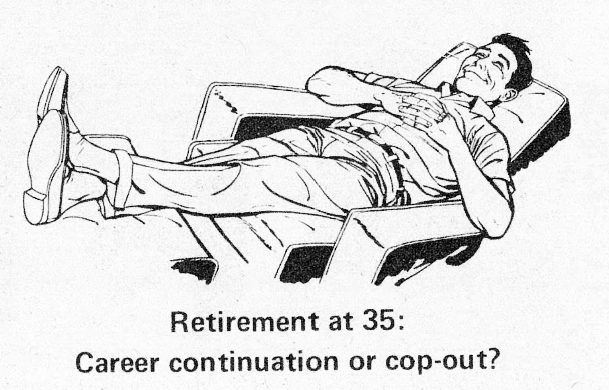
By Donald G. Begosh, S.A.M. Executive Director
Retiring at age 35 may sound I ike an intriguing proposition to some managers (or even to our campus division members who will soon become managers), but what is the reality behind such a proposition? Of course, early and enjoyable retirement is a goal of many, but the kind of “retirement” I am speaking of is an unfortunate reality for a surprising number of managers.
The “retirement” I am referring to was originally noted by Bruce H. Cole, executive vice-president and general manager with Marsteller, Inc., an advertising and public relations concern. Cole wrote a fascinating article on this topic, a few passages of which I would like to share with you:
How to retire at 35:
It’s easy. Thousands of men and women do it every year, in all walks of life. And it sets our economy, our country, and the world back thousands of years in terms of wasted human resources. But worst of all is the personal tragedy that almost always results from “early retirement.”
It usually begins with a tinge of boredom. Gradually a person’s work begins to seem endlessly repetitious. The rat race hardly seems worth it anymore. It’s at this point that many a 35-yearold “boy wonder” retires. There are no testimonial dinners or gold watches. He still goes to work every day, puts in his 40 hours, and even draws a paycheck. He’s retired, but nobody knows it. Not at first, anyhow.
The lucky ones get fired in time to make a fresh start. The less fortunate hang on for a while even decades waiting and wondering. Waiting for a raise or promotion that never comes, and wondering “Why?”
I am sure we’ve all seen similar examples of early retirement in the organizations where we work. We look at these people, and we wonder: “What happened to the enthusiastic college graduate who was going to conquer the world? What turned him (or her) into an on-the-job retiree?” These are complex and difficult questions, but I would like to try to answer them.

First, I’ve noticed that most young managers do not have carefully thought out career plans by the time they reach their mid-twenties. They have recently left the highly structured world of academe, where students need only check the course catalog to determine exactly what they must do to receive their degrees: “Management 101 is followed by Advanced Management 201, which is followed by …. “
Unfortunate for young managers is the fact that there are no similar course catalogs to follow in becoming a top-level executive in todays’ organizations. But there is something the recent college graduate can do to help make this process a little easier and at the same time reduce his chances of becoming an on-the-job retiree: Carefully develop a written career plan to help you reach your goals, and then develop enthusiasm for these goals.
Next, many managers assume that a college degree concludes their management education, and that these four years of education are adequate preparation for 40 years of work. I disagree! We live in a changing world, with constantly changing job requirements. Knowledge is a perishable commodity!
Finally, there is one more thing that can be done to stamp out job disinterest: Become an active, participatory member in your local S.A.M. chapter. S.A.M. can provide you with the challenging exchange of views with your peers that alI managers need to grow and to avoid “early retirement.” But you know that, otherwise you wouldn’t be reading this newsletter. SAM-NI
This SAM News International article is from our historical archive, information provided is for reference and archival research about the activities and developments of the Society.
